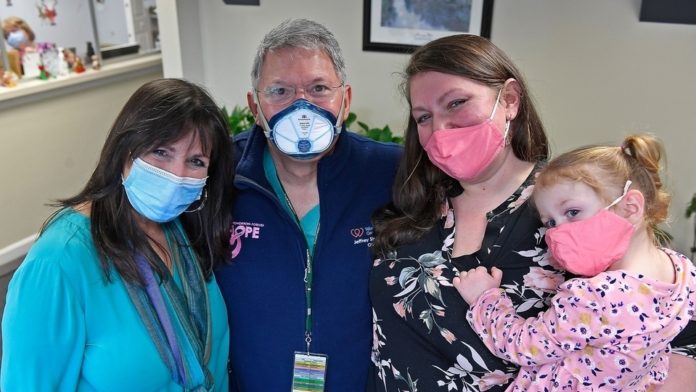New London — Babies have been Dr. Jeffrey Simpson’s business. Or, more precisely, delivering babies.
The patriarch of obstetricians delivering at Lawrence + Memorial Hospital used to keep count of every newborn he delivered. When the number went past 6,000 in 2016, he stopped counting.
For years, he kept a handwritten file, a single notation chronicling each new arrival. And then he pasted the medical labels the hospital provided with the patient’s name and vitals, in a notebook. He pulls the thick folder from a filing cabinet to show a visitor, a testament to his 34 years as an obstetrician working from an office beside the hospital and treating patients with gynecological issues and delivering women’s babies.
When electronic medical records came into being, Simpson stopped counting his deliveries. And now he’s retiring. Thursday was his last day as an obstetrician. He will continue practicing gynecology through March, and then he will close his practice at Montauk Avenue and Faire Harbour Place, in the shadow of L+M.
“I’m definitely going to miss that, I’m going to miss delivering,” said Simpson, who until his retirement was the senior practicing obstetrician in New London. “And I will miss working 8- to 12-hour days. But what I’m not going to miss is working 18-hour days, and there have been a lot of them.”
Which is likely what happened the day that Mary Fabrykiewicz McTeague gave birth to her daughter, Mary Alice, on July 24, 1986. It would be the first baby Dr. Simpson delivered at L+M, after arriving in the city to join the practice of Drs. Robert Spitz and Timothy Barczak.
A single mother, McTeague recalls how Dr. Simpson stayed beyond his shift to reassure her and to be there for the delivery. More than three decades later, McTeague, as well as her two grown daughters, are all patients of Simpson. And on May 23, 2018, he delivered Mary Alice Grotjam’s baby girl, Grace, the baby of the first baby he delivered in New London.
“He is very special to all of us,” McTeague said. “He has a way with people, he’s a natural healer, an uplifter.”
“They are all friends. They are all relationships that are special,” Simpson said of his patients.
He takes the time, said Amy Martin, one of two advanced APRNs who works in his office.
“His patients know they will probably have to wait to see him but don’t mind because they know he will give them the time they need when he walks into their exam room,” she said.
“We don’t just talk about their menstrual periods, we talk about their kids and their family and what’s happening in their lives and where their stressors are, those kinds of things, because it does reflect on their gynecological health,” Simpson said. “It takes time to develop a relationship with a patient.”
Cardiology not in the cards
A native of Evanston, Ill., Simpson didn’t set out to be an obstetrician. His father played bassoon in the Chicago Symphony Orchestra for five decades, and his mother taught at Northwestern University and was a professional cellist.
Simpson attended Dartmouth College, where he earned a degree in environmental sciences. After graduation, he returned to Chicago and worked in a lab at the medical school at Northwestern. It was there that he met a neighbor, Dr. Michael Blefeld, who would become a friend and an inspiration.
Blefeld, who has been a longtime pediatrician in Groton and a municipal medical director in the region, had gone to medical school at the University of Guadalajara in Mexico, and Simpson, who did not get into a U.S. medical school, thought he could do the same thing.
He did, and delivered his first babies at a remote clinic while studying there. Initially he thought he’d like to be a cardiologist, like a favorite paternal uncle who would take him on patient rounds with him, but once he delivered his first baby, he knew obstetrics was where he was going.
“It is still a magical event each time, it really is,” he said of delivering babies. “It is joyful.”
The most babies he has delivered in a single day is eight. The oldest woman he delivered for was 47 and the youngest, a girl, just 13. In 1987, he delivered 242 babies at L+M. He knows the exact number because he was working on his credentials for the American College of Obstetricians and Gynecologists and had to keep precise notes. He’s never delivered triplets but has delivered many sets of twins.
“They’re one in every 60 deliveries,” he said.
Simpson delivered his last baby on Tuesday. His patient went into spontaneous labor, and after finishing up his office hours, he headed over to L+M.
“We had a lovely natural vaginal delivery which was great fun and a truly rewarding conclusion to a very satisfying career in obstetrics,” he said Wednesday afternoon.
Family made sacrifices
Simpson has worked as a solo practitioner since 2007, but he has collaborations with two other local OB-GYN groups whose practitioners form a rotation to cover all the births. And he credits the success of his office to his staff, including Martin and another longtime APRN, Eileen O’Donnell, and to Valerie Hollis, his medical assistant for more than two decades.
In his opinion, the most significant medical advance in gynecology since he started his practice is endometrial ablation, a procedure that surgically destroys the lining of a uterus to reduce menstrual flow. It has decreased hospitalizations and cut the hysterectomy rate in half, he said.
There have also been significant advances in instituting better protocols for various pre-natal high-risk situations, dramatically cutting down on the number of cesarean sections.
In retirement, Simpson and his wife, Janney — they were high school sweethearts — plan to return to a century-old, family-owned log cabin in Michigan where they both summered in their youths, and he intends to get in plenty of fly fishing.
He and Janney are the parents of two grown sons, and Simpson said he will forever be grateful to his wife and children for allowing him to give so much time to his patients. He missed too many family dinners to count, as well as Halloweens, and other holidays and gatherings.
“The family has sacrificed a lot to allow me to practice medicine the way I do,” he said. “They gave me a lot of latitude to do my work.”
“He has always been such a good doctor,” Mary Fabrykiewicz McTeague said. “He always explained things so well, and he always put me at ease. I think a lot of people will be teary-eyed. He will be a hard act to follow.”
Credit: Source link






























